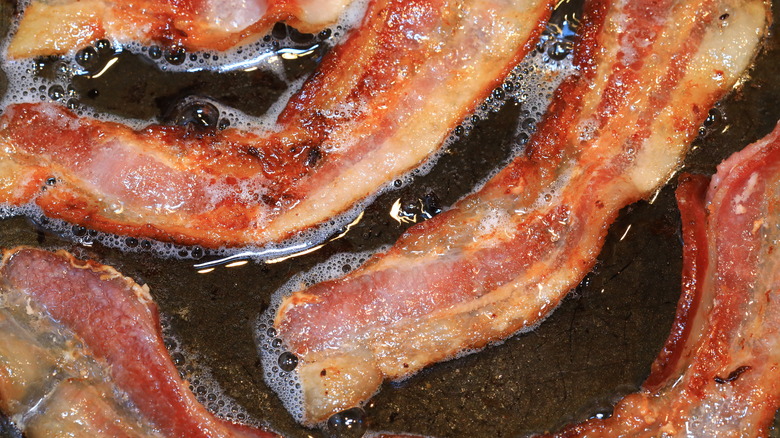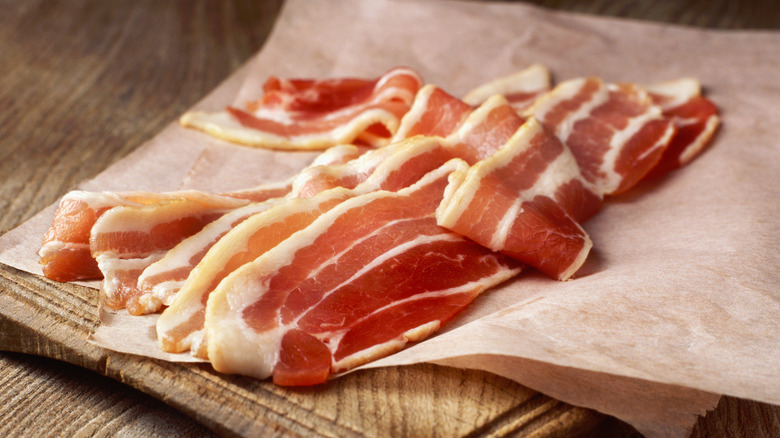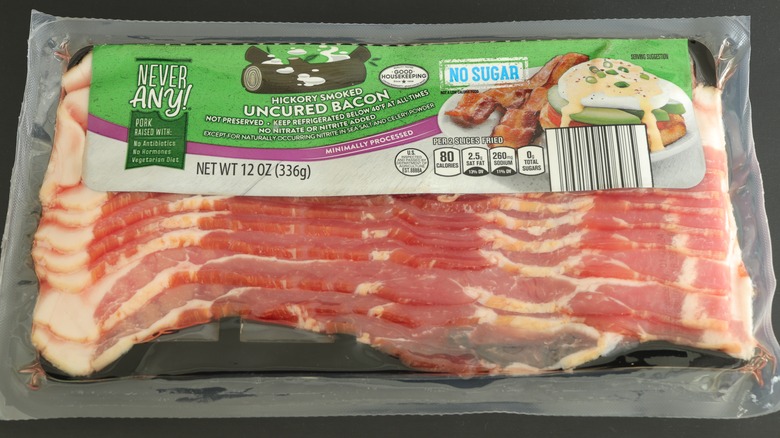Uncured Bacon Isn't Really Uncured. So What Is It?
Salty, fatty, crispy, and flavorful, bacon is the breakfast meat we can't get enough of, even if we know it's not exactly a health food. Due to its high fat, sodium, and cholesterol content, it's nearly as disapproved of by doctors as it is beloved by, well, everyone else. To add insult to injury, there's another lesser-known reason why bacon, like other processed meats, is potentially harmful to consume. When cooking at high heat (like sizzling in a pan or baking in the oven), the nitrates and nitrite additives used in the curing process form compounds called nitrosamines, which are known to cause cancer.
Under the guise of making healthier choices, some consumers opt to purchase "uncured bacon" at the grocery store or deli. But in reality, there is no such thing. Much like cured versus uncured hot dogs, this distinction is a misnomer. Bacon is, by definition, salt-cured pork, and is usually preserved with a combination of salt, sugar, and nitrates or nitrites. So what do the purveyors of "uncured bacon" mean when they use that label? Unlike its so-called "cured" counterpart, which is cured using synthetic sodium nitrite, the misleadingly-named "uncured" bacon is preserved using naturally-derived nitrites, typically from celery or other vegetables.
What is the bacon curing process?
Historically, when fresh meat was not readily available and refrigeration was not commonplace, curing was the primary method of preservation. Nowadays, cured meats have become dietary staples. The basic curing process uses salt to remove moisture from the meat, making it inhospitable for bacterial growth. However, most cured meats today also utilize sugar to neutralize the taste of the salt and feed desirable bacteria, as well as nitrites and nitrates to help kill bacteria, improve flavor, and color the meat.
Sodium nitrite is one of the most commonly used preservatives in cured meats. It reacts with the myoglobin protein in the cut to produce a reddish or pinkish color, which consumers tend to find more appealing than brown. It also inhibits the growth of the bacteria that causes botulism. Despite its benefits and widespread adoption, nitrite is extremely controversial as a food additive, as meats containing this chemical compound have been linked to cancer. The World Health Organization in 2015 classified processed meats as a Group 1 carcinogenic, meaning that evidence consistently shows that they cause the diseases, particularly colorectal types.
Though bacon may be cut from different parts of the pig depending on your locale, it's always made by salt-curing. There are two main types of the process: dry and wet. Dry curing involves rubbing the pork in curing salt, while wet curing involves injecting it with a brine. Most industrial bacon production today is done via the latter procedure, including that of "uncured bacon," which swaps out the synthetic sodium nitrite for a naturally occurring source like celery powder.
Is uncured bacon better for you?
Since it's free of artificial chemicals, uncured bacon definitely sounds healthier — but there's actually very little scientific evidence to back this claim. While it may use naturally derived nitrites instead of synthetic ones, studies suggest that the health outcomes of nitrite and nitrate use in processed meats are the same, regardless of their source. Confusingly, there are no health concerns associated with consuming the nitrites found in natural sources like celery. That's because the danger comes from the interaction between nitrites and protein, which is plentiful in meats like pork and minimal in vegetables. It's this interaction that converts the chemicals into carcinogenic nitrosamines, whether through the cooking process or in digestion.
According to the USDA, cured meats cooked at high heat are particularly known to produce nitrosamines, which is bad news for bacon. While the interaction between nitrites and amines is problematic, vitamins C and E have been shown to reduce nitrosamine levels. The USDA states that it "now requires adding 550 ppm of either sodium ascorbate or sodium erythorbate to pumped bacon" as a result. Because of the known carcinogenic effects of bacon, and the fact that even the supposedly uncured variety contains nitrites, it's advisable to be mindful of your intake. And next time you see a package of bacon that claims to be "uncured" at the grocery store, know that its health benefits are likely exaggerated.


